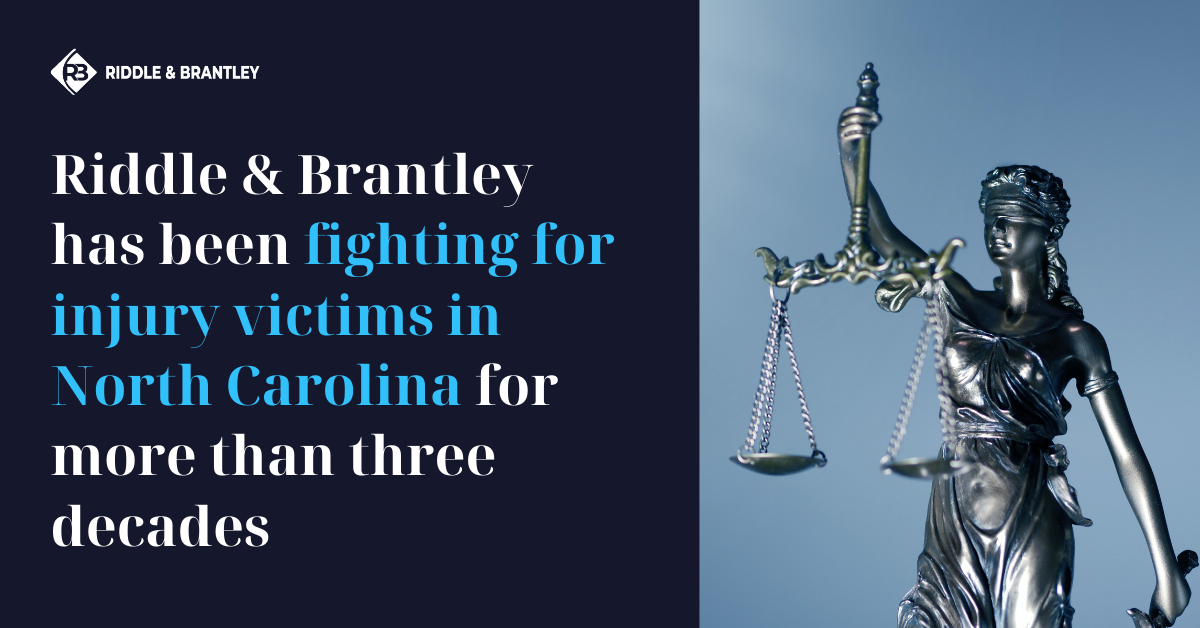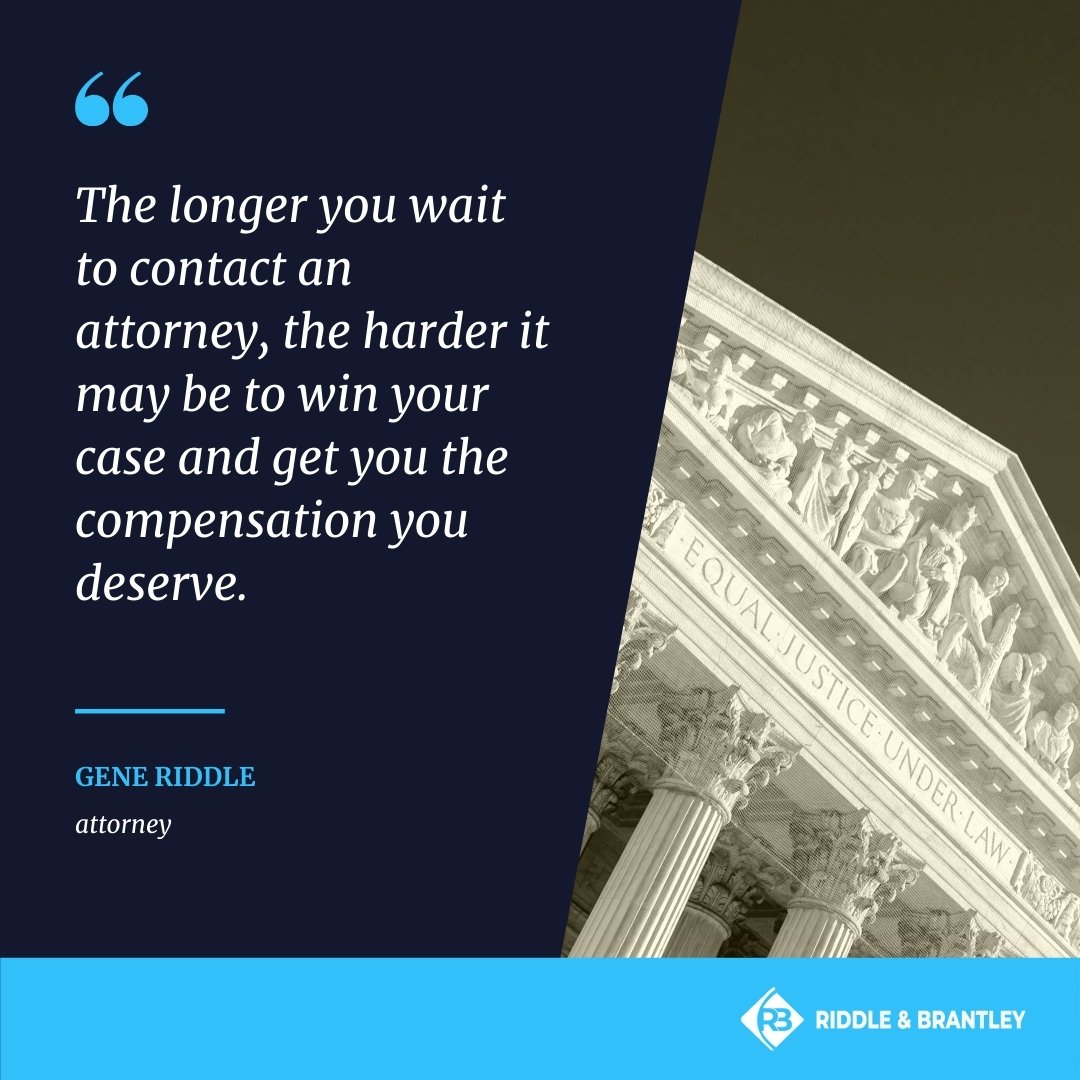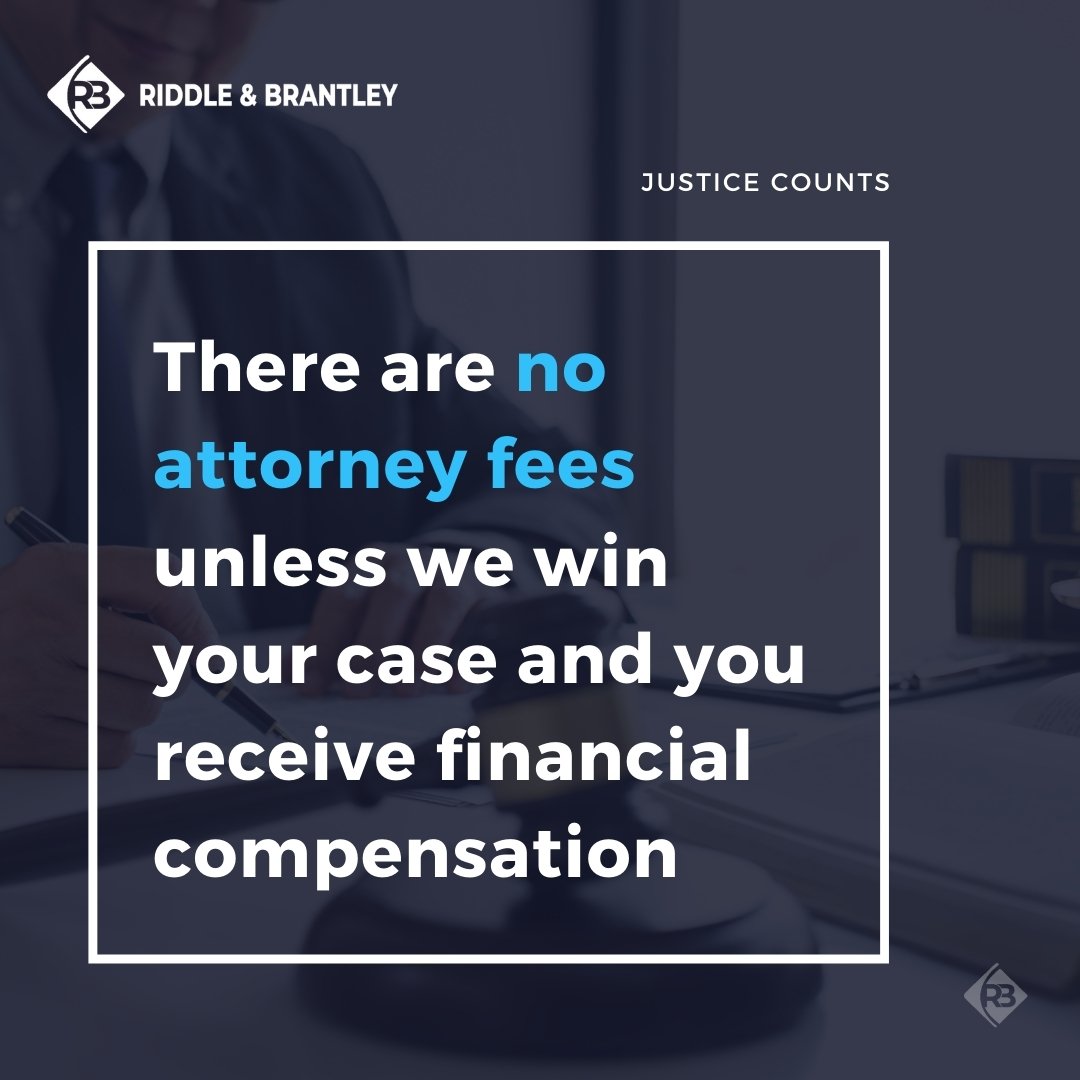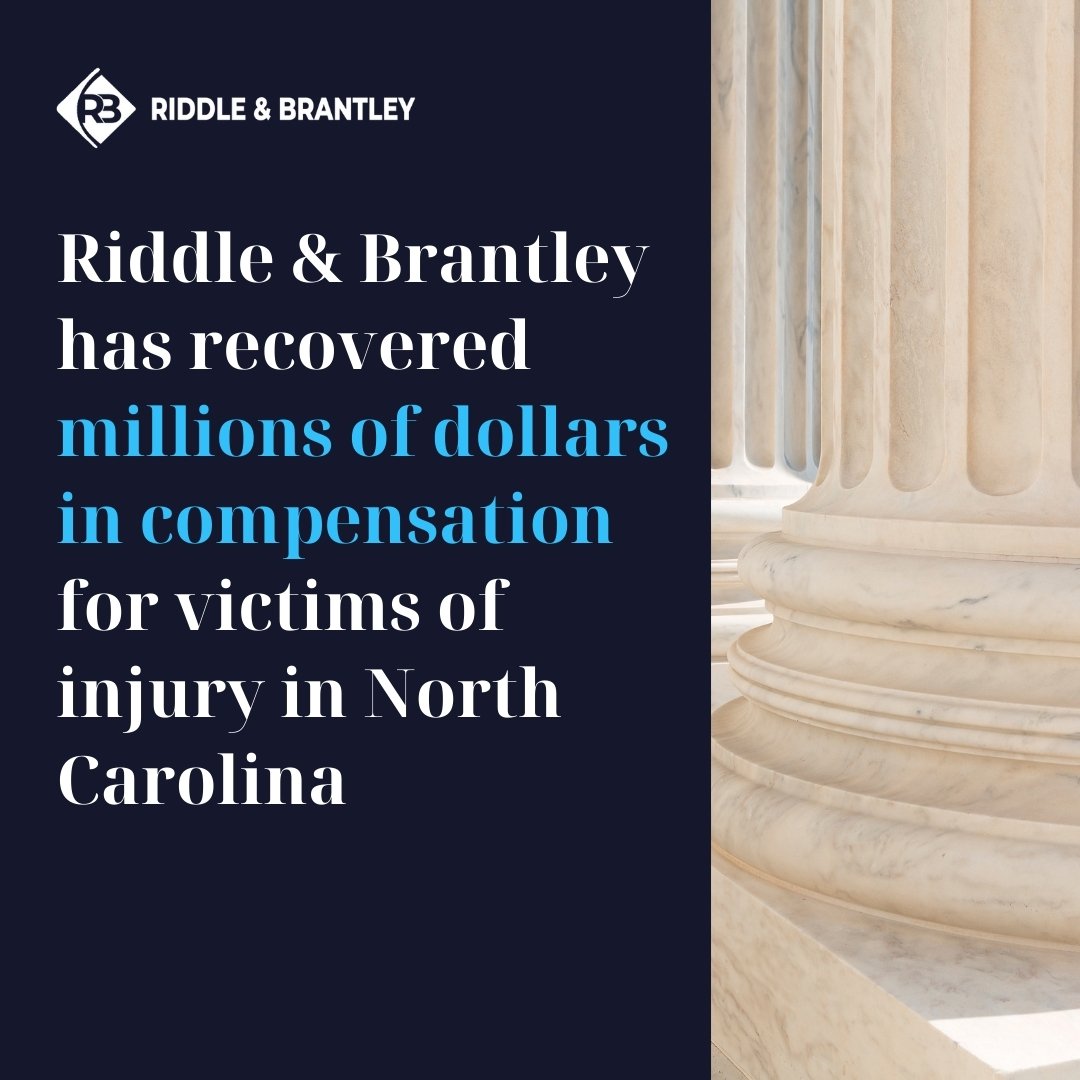North Carolina Personal Injury Lawyer
Have you been injured in an accident due to someone else’s negligence? You may have a claim for compensation and a personal injury lawyer at Riddle & Brantley may be able to help you with your claim or lawsuit.
 Riddle and Brantley proudly employs 12 personal injury attorneys with more than 220+ years in combined legal experience. Our attorneys have successfully represented thousands of injured people across the state.
Riddle and Brantley proudly employs 12 personal injury attorneys with more than 220+ years in combined legal experience. Our attorneys have successfully represented thousands of injured people across the state.
We offer in-person consultations, as well as case reviews by phone, text, email or video conference. For a FREE consultation with an experienced personal injury lawyer, please call 1-800-525-7111 or complete the fast and easy form below.
There are no upfront costs and you won’t pay any attorney fees unless we win your case and you receive financial compensation.
Our personal injury lawyers are here to help. There is never any obligation and the consultation is always free. Please call 1-800-525-7111 and let’s review your claim. You may be entitled to compensation.
“Riddle & Brantley found me all the available money from the insurance companies.”
-David Howard, Riddle & Brantley client
Serving Clients Across North Carolina
We are proud to serve the people of North Carolina and handle cases across the entire state, including in:
- Raleigh
- Durham
- Greensboro
- Winston-Salem
- High Point
- Asheville
- Boone
- Gastonia
- Charlotte
- Kannapolis
- Concord
- Fayetteville
- Goldsboro
- Greenville
- Kinston
- Jacksonville
- New Bern
- Wilmington
Many of our attorneys and staff have close family ties to the military and we are proud to serve North Carolina’s servicemen and women, including those serving at Fort Bragg, Seymour Johnson Air Force Base, Camp Lejuene, and Marine Corps Air Station Cherry Point.
If you’ve been injured, we would love to help if we can. Please call 1-800-525-7111 today for a FREE, no-obligation case review and consultation with an experienced NC injury attorney.
Do You Have a Personal Injury Claim?
 Accidents occur in the blink of an eye, often leaving victims with high medical bills, lost wages and the burden and expense of long-term treatment.
Accidents occur in the blink of an eye, often leaving victims with high medical bills, lost wages and the burden and expense of long-term treatment.
Were you or a loved one injured in an accident due to another’s negligence? If so, you may be entitled to compensation.
For a FREE, no-obligation consultation with an experienced personal injury lawyer, please call 1-800-525-7111.
We will review your claim, advise you on your best available legal options, and if you decide to hire us, fight tirelessly for your right to compensation.
There are no upfront costs and we don’t get paid unless you do. If we don’t recover compensation for you, you won’t pay any attorney fees. Please call 1-800-525-7111 today for a free consultation.
Let us handle the stress of pursuing your injury claim and negotiating with the insurance companies so you can focus on what’s most important — your recovery.
We believe Justice Counts for those injured due to others’ negligence and we would love to help you and your loved ones however we can.
“This settlement changed me and my family’s lives.”
–Linda B., Riddle & Brantley client
Experienced Injury Attorneys Handling All Types of Cases
If you’ve been injured due to the negligence of another person or company, you may have a claim for compensation, and there’s a good chance our personal injury attorneys may be able to help you with your claim or lawsuit.
In more than three decades handling cases across the state of North Carolina, our injury attorneys have helped thousands of clients seek justice and compensation.
Personal injury lawyers at Riddle & Brantley handle all types of injury cases, including:
- Car accidents
- Truck accidents
- Tractor-trailer accidents
- Motorcycle accidents
- Bicycle accidents
- Pedestrian accidents
- Wrongful death cases
- Work injury claims
- Slip and fall accidents
- Uber and Lyft accidents
- Product liability claims
- Premises liability accidents
- Dangerous drug cases
- Dog bites and animal attacks
- Sexual assault cases
- Constitutional rights
- Mesothelioma due to asbestos exposure
- Police brutality
- Boat accidents
Keep in mind that this list is not exhaustive. We evaluate each claim on a case-by-case basis. Therefore, if you believe that you might have a personal injury claim, call 1-800-525-7111 today to speak with an experienced personal injury lawyer.
 You deserve justice and we would love to help you if we can.
You deserve justice and we would love to help you if we can.
In the most heartbreaking cases, we have wrongful death lawyers available to help family members fight for justice on behalf of lost loved ones.
If your injury occurred while on the job, our workers’ compensation attorneys can handle those claims, as well, and we have Social Security disability lawyers on staff to assist when injuries result in long-term disability.
Our attorneys also handle a variety of mass tort and class action cases, including Zantac cancer claims, Johnson & Johnson baby powder cancer claims, defective 3M military earplugs cases, AFFF firefighting foam cancer claims, and more.
For a FREE, no-obligation consultation with an experienced personal injury lawyer, please call 1-800-525-7111.
The consultation is free and we don’t get paid if you don’t.
Please call 1-800-525-7111 today and let’s review your claim.
“They made a hard time in my life easier to endure.”
-Melissa C., Riddle & Brantley client
What Our Clients Are Saying
The attorneys at Riddle and Brantley are proud of what our former clients have to say about their experience working with our firm.
- “They turned a heartbreaking situation completely around.” -Tonya T.
- “Every time I’ve needed them, they were there for me.” –Tyronnie T.
- “[Riddle & Brantley] increased my final settlement payment by 33 percent.” -Charles H.
- “It was nice to see Riddle & Brantley put me and my needs first. I would strongly recommend contacting this firm to handle your needs.” -R. Colley
- “I would recommend them to anyone. They fought hard for me.” -Christine W.
Our Record of Results
With over 220+ years of combined legal experience, the attorneys of Riddle and Brantley are extremely proud of how we have successfully represented our clients.
In more than 35 years serving the people of North Carolina, our personal injury lawyers have recovered millions of dollars in compensation (see disclaimer below), including:
- $9,450,000 | Truck Accident & Wrongful Death– In this case, our trial attorneys represented the relatives of a deceased family of four after a tractor-trailer slammed into the back of them. Our legal team filed multiple lawsuits and reached substantial settlements with all responsible parties prior to the respective trials.
- $7,850,000 | Chemical Spill & Premise Liability – After a chemical spill occurred in Apex, North Carolina, attorney Donald Dunn helped residents file a class action lawsuit. This resulted in a $7,850,000 settlement.
- $5,000,000 | Constitutional Rights Violation & Cruel and Unusual Punishment – Attorney Gene Riddle represented five female inmates who forced to sexually engage with a sheriff’s deputy. On behalf of these five women, Riddle and Brantley brought a civil suit against the Wayne County Sheriff’s department. We obtained a verdict of $1.5 million in actual damages and $3.5 million in punitive damages. It is important to note that not all of the verdict was received because there wasn’t enough insurance coverage.
- $ 1,000,000 | Dog Bite – Attorneys Adam Smith and Gene Riddle litigated a dog bite claim for their 74-year-old client, who was attacked by a neighbor’s dogs on her own property. We successfully litigated this claim and obtained a verdict of $1 million. Prior to trial, we discovered that the defendant did not have any insurance. However, our firm believes that everyone deserves justice, so we decided to litigate the claim anyway. Even though we did not collect any attorney fees, Gene Riddle asserts procuring this judgement is one of his proudest moments as an attorney. Our hope for our client is that she received some justice from the money judgement against the defendant.
- $450,000 | Burning Accident – During a church-sponsored cookout, a child was severely burned from hot coals dumped on the playground. These injuries resulted in second- and third-degree burns. Attorney Gene Riddle filed suit, however a settlement was reached before the trial began.
*** Disclaimer: The results mentioned are intended to illustrate the type of cases handled by the firm. These results do not guarantee a similar outcome, and they should not be construed to constitute a promise or guarantee of a particular result in any particular case. Every case is different, and the outcome of any case depends upon a variety of factors unique to that case.
The cases illustrated above are just a few of the types of personal injury cases Riddle and Brantley handles. Have you sustained serious injuries from an accident due to the fault of another? You might be entitled to compensation.
Please call 1-800-525-7111 to speak with our legal team today, and we will evaluate your personal injury claim free of charge and at no obligation.

The consultation is free and you won’t pay any attorney fees unless we recover compensation for you.
Don’t wait — the longer you wait to contact our personal injury lawyers, the harder it may be to win your case and recover the compensation you need and deserve.
Call 1-800-525-7111 or complete the short form below for a free, no-obligation consultation and case review with an injury attorney.
Award-Winning Personal Injury Lawyers
Since founding the firm in 1985, attorney Gene Riddle has been recognized by many prestigious organizations (see disclaimer below) for his experience and results. These include:
- Multi-Million Dollar Advocates Forum
- Million Dollar Advocates Forum
- The National Trial Lawyers Top 100
- Super Lawyers
- The National Association of Distinguished Counsel
Attorney Riddle is also the recipient of the 2014 Litigator Award and maintains an AV Preeminent rating from Martindale-Hubbell, representing the organization’s top rating for attorneys (see disclaimer below).
Many of our other attorneys have been recognized for their experience and accomplishments, as well.
Our Commitment to Our Clients
At Riddle & Brantley, we take even the toughest cases because we are committed to justice for the people of North Carolina and visitors to our great state. We believe ALL people deserve justice, no matter what.
Our firm strives to treat every client like family. When you hire Riddle & Brantley’s personal injury lawyers, you’ll not only be represented by an experienced attorney, but you’ll also be supported by an entire team of paralegals, investigators, and case managers, all dedicated to your success.
“They handled my case very professionally, with respect from beginning to end.”
–Joseph P., Riddle & Brantley client
“What can a personal injury lawyer do for me?”
Injury cases can be complicated, stressful, and time-consuming. At Riddle & Brantley, our goal is to make the entire process as easy and stress-free as possible for you.
An NC injury attorney at Riddle & Brantley can handle all aspects of your personal injury case from beginning to end, including:
- Investigating the accident scene
- Recovering and preserving important evidence
- Identifying and interviewing potential witnesses
- Hiring outside experts like accident reconstructionists and truck safety experts
- Obtaining the official accident report
- Obtaining video footage such as dash cam and security camera video
- Referring you to trusted medical providers
- Negotiating with the insurance company and defense counsel
- Preparing you for statements to the insurance company
- Filing a lawsuit if necessary
- Representing you in court hearings
- Representing you in mediation and/or arbitration proceedings
- Drafting legal briefs and other court documents
- Conducting depositions
- Representing you at trial
- Helping negotiate your medical liens
- Setting up trusts and guardianships for long-term care
- And much, much more…
 We even have experienced investigators on staff to assist with investigating accident scenes, and routinely bring in outside experts to help prove liability. In one recent case we even subpoenaed traffic data from Google Maps in order to prove fault.
We even have experienced investigators on staff to assist with investigating accident scenes, and routinely bring in outside experts to help prove liability. In one recent case we even subpoenaed traffic data from Google Maps in order to prove fault.
You don’t have to go through this alone.
Our personal injury lawyers understand the law in this state and know how to handle tough negotiations with insurance companies. We know the tricks that insurance companies often use to try and deny your claim, and we fight tirelessly for maximum compensation for our deserving clients.
For a FREE, no-obligation consultation with an experienced personal injury lawyer at Riddle & Brantley, please call 1-800-525-7111.
There is no obligation and you won’t pay a dime in attorney fees unless we win your case. It’s as simple as that. If you don’t receive compensation, we don’t get paid.
Please call 1-800-525-7111 today and let’s review your case.
Justice Counts for those injured due to others’ negligence and we would love to help you if we can.
*** Disclaimer: The results mentioned are intended to illustrate the type of cases handled by the firm. These results do not guarantee a similar outcome, and they should not be construed to constitute a promise or guarantee of a particular result in any particular case. Every case is different, and the outcome of any case depends upon a variety of factors unique to that case.
*** Disclaimer: An attorney must meet certain requirements to join these organizations or receive these awards. For more information on Membership Criteria for Million Dollar Advocates Forum, Multi-Million Dollar Advocates Forum, Super Lawyers, The National Trial Lawyers Top 100, The National Association of Distinguished Counsel, AV Preeminent by Martindale-Hubbell, the Litigator Award, and other memberships, awards, and accolades, please visit our Membership Criteria page. These awards and memberships should not be construed as a promise or guarantee of a similar result. Each case is different and must be evaluated separately.